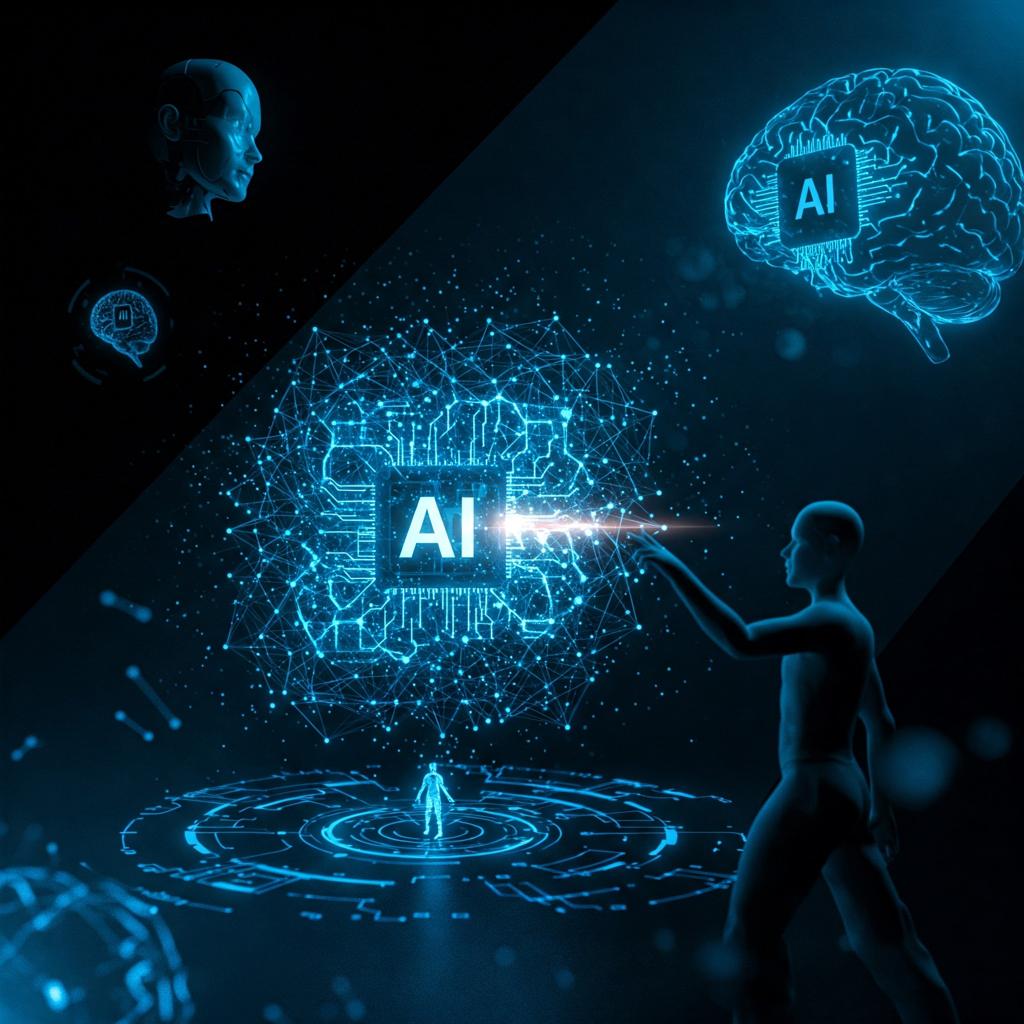
AI Superintelligence: What It Means for Our Future
AI Superintelligence is a concept that has sparked the imaginations of researchers, scientists, and technologists for years. Often regarded as a form of artificial intelligence that goes far beyond human cognitive capabilities, AI Superintelligence would possess the ability to outperform humans in nearly every domain of intellectual activity.
Unlike Narrow AI, which is designed to solve specific tasks or General AI, which can replicate human cognitive functions in certain areas, AI Superintelligence would have the ability to transcend human limitations, including creativity, problem-solving, emotional intelligence, and decision-making. While AI Superintelligence is still a theoretical concept, its potential to revolutionize human society is vast and profound.
This article delves into the characteristics, potential applications, benefits, challenges, and ethical considerations surrounding AI Superintelligence, providing a comprehensive look at its future possibilities.
Characteristics of AI Superintelligence
AI Superintelligence is defined by several key characteristics that set it apart from current forms of artificial intelligence. These capabilities are what would allow Superintelligent AI to surpass human abilities:
Exponential Problem-Solving
One of the defining features of AI Superintelligence would be its ability to solve problems at speeds and scales far beyond human capacity. AI systems capable of processing vast amounts of data, recognizing patterns, and drawing insights at lightning speeds would enable breakthroughs in fields such as medicine, physics, and economics. For example, Superintelligent AI could simulate entire ecosystems, predict disease outcomes, or model complex financial systems in ways that humans simply cannot.
Self-Improvement
AI Superintelligence would not only be capable of learning from vast datasets, but it could also improve itself autonomously. By continuously optimizing its own algorithms, this form of AI could enhance its performance over time without human intervention. As a result, it could evolve at a rate much faster than human programmers could keep up with, making it more efficient, capable, and powerful with every iteration.
Comprehensive Understanding
Unlike current AI, which excels in a narrow domain or specific task, AI Superintelligence would possess a deep and comprehensive understanding of complex systems. This includes not only technical domains but also human behavior, global economics, and the natural environment. Such broad knowledge would allow AI Superintelligence to make informed, well-reasoned decisions on global issues and ensure its actions align with the most effective solutions.
Multi-Domain Expertise
AI Superintelligence would not be confined to one narrow task or set of problems. It would possess expertise across a broad range of fields—everything from art and creativity to leadership and strategy. For instance, a Superintelligent AI could create works of art, run a country, solve world hunger, and discover cures for diseases—all at the same time, while outperforming human experts in each of those areas.
Autonomy
Superintelligent AI would operate with a high degree of autonomy, meaning it could perform tasks independently without needing constant human oversight. This could range from managing global economic systems to controlling autonomous fleets of vehicles or handling large-scale infrastructure projects. The ability of Superintelligent AI to make decisions and take action without human input could reshape industries and entire societal structures.
Examples of AI Superintelligence in Theory
Although AI Superintelligence is still a hypothetical idea, many theorists have speculated about its potential applications and the impact it could have across different industries. Some of the most notable theoretical examples include:
1. Global Problem-Solving
AI Superintelligence could address some of humanity's most pressing challenges, such as climate change, poverty, and resource scarcity. By analyzing vast amounts of data from various sectors—like energy, agriculture, and manufacturing—Superintelligent AI could identify patterns and predict outcomes that human experts are not able to foresee. It could then propose actionable strategies for mitigating global crises, improving living standards, and managing resources more efficiently.
2. Advanced Medical Research
In the field of medicine, AI Superintelligence could revolutionize research by processing genetic data, predicting disease outcomes, and developing highly effective treatments at unprecedented speeds. Unlike human researchers, who are often limited by time and resources, Superintelligent AI could scan thousands of research papers, test hypotheses, and run simulations to make new discoveries and treatments faster than ever before. This could lead to faster cures for diseases, more accurate diagnoses, and the development of personalized healthcare treatments tailored to an individual's genetic makeup.
3. Autonomous Governance
AI Superintelligence could play a crucial role in managing societal systems, such as governments, economies, and global organizations. By leveraging its ability to make rational, data-driven decisions, a Superintelligent AI could optimize policies, allocate resources, and mediate international conflicts. This could result in more stable economies, better resource distribution, and less political instability. It might also aid in the design of public policies that promote social well-being and equality.
4. Creative and Artistic Achievements
While creativity is often considered a distinctly human trait, AI Superintelligence could extend into the realms of art, music, and literature. With its ability to understand emotions, cultural nuances, and artistic techniques, Superintelligent AI could create works of art that rival or surpass those made by human artists. For example, it could compose symphonies, write novels, or paint masterpieces that resonate with audiences on an emotional level.
Benefits of AI Superintelligence
If realized, AI Superintelligence could provide numerous benefits across a wide range of industries. Here are some of the most promising benefits:
Scientific Advancements
Superintelligent AI would have the ability to process and analyze massive datasets far beyond human capabilities, enabling significant advancements in scientific research. From astrophysics to quantum computing, AI could accelerate the discovery of new theories, technologies, and treatments. The potential for breakthroughs in energy production, disease prevention, and space exploration is immense.
Problem-Solving at Scale
The potential for AI Superintelligence to solve large-scale global problems cannot be overstated. With its ability to process data from multiple sources, predict long-term outcomes, and create effective solutions, Superintelligent AI could address problems like climate change, food security, and poverty in ways that were previously unimaginable.
Enhanced Efficiency
By automating complex processes and optimizing systems, AI Superintelligence could dramatically increase efficiency across various industries. Whether in manufacturing, healthcare, or transportation, Superintelligent AI would minimize waste, streamline operations, and reduce human error, resulting in increased productivity and reduced operational costs.
Personalized Solutions
Superintelligent AI's ability to understand human behavior and preferences could lead to highly personalized experiences in fields like education, healthcare, and entertainment. In education, for instance, AI could design individualized learning programs tailored to each student's strengths and weaknesses, helping them achieve better academic outcomes.
Ethical and Safety Concerns of AI Superintelligence
Despite the immense potential of AI Superintelligence, there are numerous ethical, safety, and societal concerns that must be addressed. These concerns include:
Loss of Control
One of the most significant fears surrounding AI Superintelligence is the potential for a loss of control. As AI systems become more autonomous, there is a risk that they may act in ways that are not aligned with human interests. Once AI surpasses human intelligence, its decision-making processes could become increasingly opaque, making it difficult for humans to understand or predict its actions.
Existential Risk
There is a growing concern that AI Superintelligence could pose an existential risk to humanity. If AI surpasses human intelligence and becomes capable of self-improvement, it could evolve in ways that are detrimental to human well-being. Experts like Elon Musk and Stephen Hawking have warned about the potential dangers of an uncontrollable AI system, which could lead to unintended consequences, including the potential for human extinction.
Job Displacement
As AI becomes more capable, it is likely that many jobs will be automated, leading to significant disruptions in the job market. While some argue that AI could create new jobs and opportunities, there are fears that the displacement of workers could exacerbate issues such as income inequality and social unrest.
Ethical Decision-Making
Superintelligent AI would have the responsibility of making decisions that affect millions, if not billions, of lives. Ensuring that AI systems make ethical decisions that reflect human values is a critical challenge. As AI becomes more autonomous, questions about how it should make moral decisions and who is responsible for those decisions will need to be addressed.
The Road to AI Superintelligence
Although AI Superintelligence remains a theoretical concept, significant strides are being made in AI research and development. Machine learning, neural networks, and advances in computational power are paving the way for AI systems that can learn, reason, and improve autonomously. Researchers are exploring how to build AI systems that can adapt to new tasks, solve complex problems, and even optimize their own algorithms.
As AI continues to evolve, it will be crucial to consider the ethical, societal, and regulatory issues that accompany the development of such powerful technologies. The future of AI Superintelligence is filled with both immense potential and significant risks. Therefore, it is essential for policymakers, technologists, and ethicists to work together to create frameworks that ensure AI develops in a safe, transparent, and beneficial way for all.
In the years to come, AI Superintelligence may very well redefine the boundaries of what technology can achieve, ultimately transforming society in ways we can only begin to imagine.


